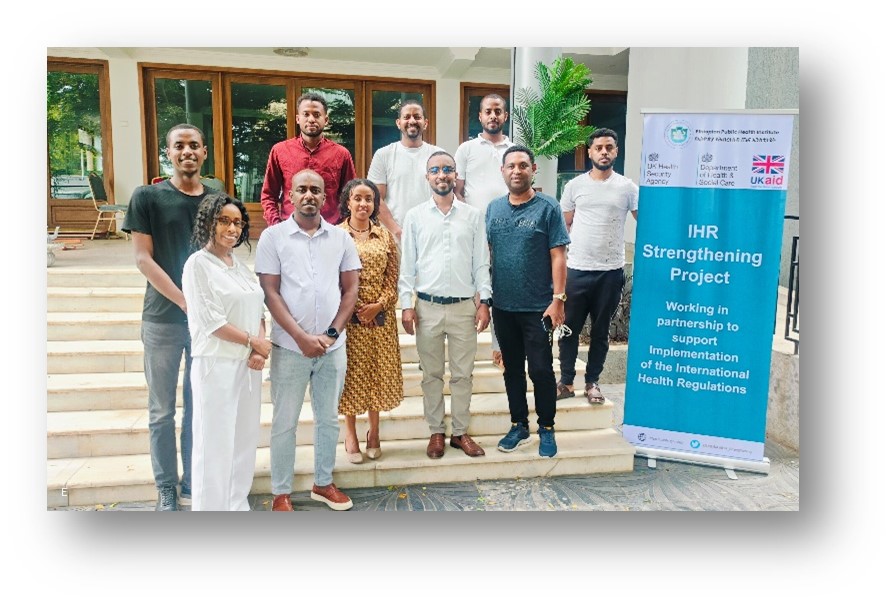
In June 2025, the UK Health Security Agency (UKHSA) International Health Regulations Strengthening Project (IHR-SP) in collaboration with the Ethiopian Public Health Institute (EPHI) Chemical, Biological, Radiological, and Nuclear (CBRN) team, undertook a major effort to advance Ethiopia’s chemical risk management capacity through two consecutive workshops.
The first workshop, conducted from June 13th to 17th, focused on developing comprehensive user guidance manuals for Ethiopia’s new chemical risk assessment and risk mapping tools. Bringing together experts from across key sectors - including EPHI’s Preparedness, Travel and Border Health, and CBRN teams, and the Ministry of Agriculture, this five-day event was dedicated to developing clear, practical manuals tailored to Ethiopia’s local contexts and needs. The manuals provide step-by-step instructions to help users understand the tools and how to use them effectively across multiple levels of public health and environmental management in the country. UKHSA IHR-SP’s Chemical and Environmental Technical Adviser provided technical contribution and facilitated the group session dedicated to tailoring these manuals.
The partnership between UKHSA and EPHI was pivotal in making the guidance materials contextually relevant by jointly reviewing local data and engaging stakeholders throughout the development process. The materials, now under review, will soon help stakeholders to better detect, assess, and respond to chemical hazards once approved.
Building on this foundation, a second workshop was held shortly after, from June 27th to 29th, dedicated to validating the newly developed chemical risk assessment tool. This validation workshop brought together a wide range of participants including representatives from the Ministry of Agriculture, regional agricultural departments, and regional chemical regulatory authorities. The UKHSA IHR-SP Chemical and Environmental Technical Adviser facilitated hands-on exercises, offering technical guidance on the tool’s application. Through in-depth discussions and practical testing, participants assessed and tested the tool’s feasibility, usability, and relevance to real-world scenarios faced in Ethiopia.
The validation process was crucial in assessing the tool’s readiness for pilot implementation, shedding light on strengths and areas needing refinement. Feedback collected during the validation workshop will be reviewed and integrated by EPHI, together with stakeholders to improve the tool’s accuracy and user-friendliness before it is piloted. This workshop also strengthened collaboration among stakeholders to ensure the tool’s wide acceptance and use in the future.
Eyob Getachew, UKHSA IHR-SP Ethiopia’s Technical Advisor for Chemical and Environmental Hazards said, “These two workshops show great progress in Ethiopia’s chemical risk management by combining clear guidance with practical testing. The strong partnership between EPHI and UKHSA IHR-SP reflects a shared commitment to improving health security and chemical safety preparedness nationwide.”
Looking ahead, EPHI and UKHSA will work together to develop a comprehensive plan to roll out the chemical risk assessment tool along with its user guidance across Ethiopia. This plan will focus on selecting pilot regions for testing, building skills, allocating necessary resources, and monitoring progress to strengthen chemical safety systems. By integrating the tool and guidance we aim to achieve both improved prevention of chemical incidents and enhance response capabilities, ensuring timely identification and management of chemical risks nationwide.

Useful Resources
Related Articles
-
Building future successes in Ethiopia’s Chemical, Biological, Radiological and Nuclear (CBRN) Performance with collaborative Annual Review meeting
BY IHR -
Strengthening Ethiopia’s CBRN Surveillance and Response Capabilities through ‘training of trainer’ workshop
BY IHR -
Africa CDC PHEM Fellows receive first training on chemical, biological, radiological and nuclear hazards
BY Eyob Getachew Tensaw, Lydia Izon-Cooper, Addisalem G Taye
Please Sign in (or Register) to view further.